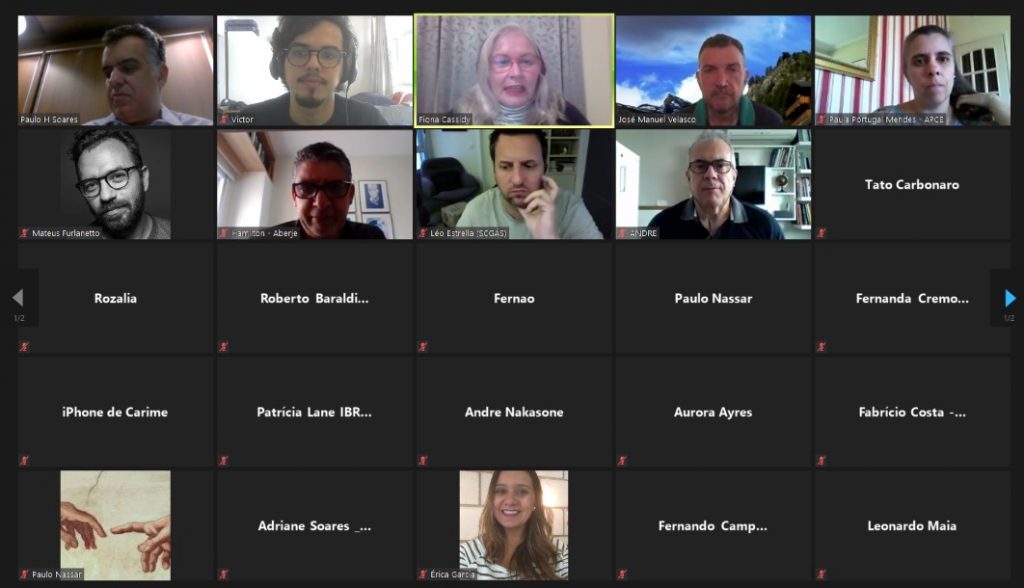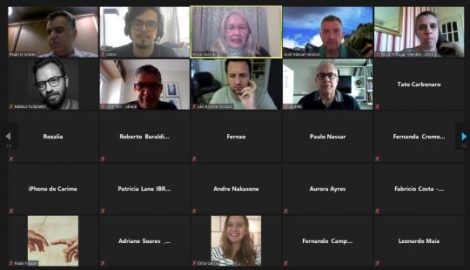Global and local perspectives: Communication in the fight against the pandemic in New Zealand and Spain
The online meeting promoted by Aberje gathered communication professionals from both countries

Much more than inform, communicate is to contextualize information. In a crisis, such as the Covid-19 pandemic, communication, experienced globally or locally, can affect the lives of millions of people.
For a long time, Spain was one of the epicenters of this crisis on the European continent. On the opposite side, New Zealand is an example of success in fighting Covid-19. To discuss the perspectives of both countries, LiderCom, a group of communication leaders from Aberje, took part in the online meeting Global and local perspectives: Communication in the fight against the pandemic in New Zealand and Spain on June 16.
The meeting gathered consultant José Manuel Velasco, a member of the Association of Communication Directors (Dircom) from Spain and Fiona Cassidy, from Public Relations Institute of New Zealand (PRINZ) (Prinz). The event was mediated by Paulo Henrique Soares, Director of Communication at the Brazilian Mining Institute (IBRAM).
Staying in the ‘bubble’ made the difference
The social “bubble” – a term that gained popularity with New Zealand’s success in the fight against the pandemic – included small precautions that were reinforced continuously by security messages sent across the country. For Fiona Cassidy, it was this public consensus that helped to keep the lockdown criteria.
She said that every day, always at the same time, the Prime Minister of New Zealand, Jacinda Ardern, and the Director-General of Health, Ashley Bloomfield, held an online conference accessible to all 5 million inhabitants of the country. “In a short period, it looked like New Zealand had stopped – and that went on for about 60 days. This collective respect, in fact, made the difference,” she said.
Recognizing the impact the pandemic would have on the population, the New Zealand government closed borders and trade and restricted commercial flights early in the pandemic. As a result, New Zealand recorded only one case of the disease in late May. After that, two other cases were discovered, but they were of individuals who had arrived from Australia.
Challenges experienced by communicators in Spain
The Spanish consultant José Manuel Velasco began his presentation by recalling that his country has 47 million inhabitants and receives 70 million tourists annually – key factors, in his opinion, to understand Spain’s difficulty in fighting the pandemic.
“Our economy depends a lot on services and tourism, and we don’t have many industries,” said Velasco, citing the forecast of a 15% drop in Spanish GDP by international institutions. “During the pandemic, companies showed their humanitarian side and put people ahead of businesses. Soon, it will be difficult to choose between people and business,” he said.
Velasco stressed that the health of employees must remain at the center of companies’ concerns. “It is necessary to give a reason for employees to increase their commitment to their role in this time of recovery; they need motivation.”
Another challenge is to train people to communicate better. “We need to prepare our spokespersons for possible public calamities like this and convince executive positions that communication is an extremely relevant tool for a company,” he said.
Examples that will remain after the pandemic
Fiona Cassidy, from Prinz, said that due to all events brought up by the pandemic, communication professionals must have learned to recognize the benefits of the speed of information dissemination. According to Cassidy, the main difference between this and other crises is that digital channels played a much more critical role in the distribution of information. “It can be said that communication was instrumental in positioning New Zealand where it is today,” she said.
In turn, Velasco believes that companies will devote more attention and resources to internal communication in the post-pandemic. “Popular credibility with companies and organizations has diminished over the years. That is why stakeholders are increasingly influencing the external public”.
Cassidy believes that there will be a change in the relationship between the private sector and the public sector. “The large New Zealand companies that had to lay off a considerable portion of their employees during the pandemic did so in a transparent manner. The truth is fundamental when dealing with the lives and well-being of human beings.”
Velasco also highlighted the transparency factor in his speech. According to him, the Spanish government must preserve this dialogue with the private sector to maintain the level of engagement in social causes. “I can say that the Spanish government has come to recognize the help that companies can provide for the public healthcare system and the quality of life of the population.”
COMENTÁRIOS:
Destaques
- Sports as an instrument of Change
- Aberje Launches Newsletter with Economic Panorama
- Charting a Path to Responsible Communication: WPRF 2023 Wraps Up in Chennai, India
- Global Alliance AGM elects new Board 2023
- Aberje discloses its positions on the Fake News Bill (PL 2630/2020)
ARTIGOS E COLUNAS
Marcos Santos Maratona da vidaMônica Brissac Thought Leadership: marca pessoal x reputação corporativaLetícia Tavares Liderança comunicadora: um tema sempre atualHamilton dos Santos Comunicação é estratégica na economia contemporâneaCarlos Parente Um salto ornamental para mergulhar no pires




























